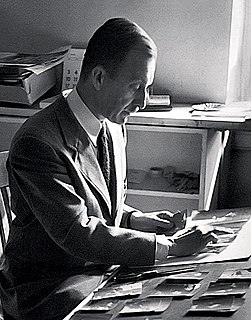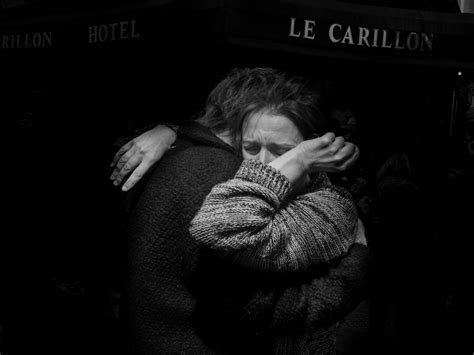A Quote by Bill Brandt
It is essential for the photographer to know the effect of his lenses. The lens is his eye, and it makes or ruins his pictures. A feeling for composition is a great asset. I think it is very much a matter of instinct. It can perhaps be developed, but I doubt if it can be learned. To achieve his best work, the young photographer must discover what really excites him visually. He must discover his own world.
Related Quotes
I think that the photographer must completely control his picture and bring to it all his personality, and in this area most photographs never transcend being just snapshots. When a great photographer does infuse the snapshot with his personality and vision, it can be transformed into something truly moving and beautiful.
In a sense, the religious person must have no real views of his own and it is presumptuous of him, in fact, to have any. In regard to sex-love affairs, to marriage and family relations, to business, to politics, and to virtually everything else that is important in his life, he must try to discover what his god and his clergy would like him to do; and he must primarily do their bidding.
The judge's authority depends upon the assumption that he speaks with the mouth of others. That is to say, the momentum of his utterances must be greater than any which his personal reputation and character can command, if it is to do the work assigned to it - if it is to stand against the passionate resentments arising out of the interests he must frustrate - for while a judge must discover some composition with the dominant trends of his times, he must preserve his authority by cloaking himself in the majesty of an overshadowing past.
The personality and style of a photographer usually limits the type of subject with which he deals best. For example Cartier-Bresson is very interested in people and in travel; these things plus his precise feeling for geometrical relationships determine the type of pictures he takes best. What is of value is that a particular photographer sees the subject differently. A good picture must be a completely individual expression which intrigues the viewer and forces him to think.
I was photographing the photographer Brassaï. He had very prominent eyes, like a frog's. As I focused my lens, he brought his hand up and pretended to focus his eye. It was a joke, but it added mystery to the picture. There's a sense of action in a very small world. Or with Allen Ginsberg there were people smoking cigarettes and in the smoke there's a sense of motion. It makes much out of very little.
One view of photography is that it is a zen-like act which captures reality with its pants down - so that the vital click shows the anatomy bare. In this, the photographer is invisible but essential. A computer releasing the shutter would always miss the special moment that the human sensibility can register. For this work, the photographer's instinct is his aid, his personality a hindrance.
In common with other artists the photographer wants his finished print to convey to others his own response to his subject. In the fulfillment of this aim, his greatest asset is the directness of the process he employs. But this advantage can only be retained if he simplifies his equipment and technic to the minimum necessary, and keeps his approach from from all formula, art-dogma, rules and taboos. Only then can he be free to put his photographic sight to use in discovering and revealing the nature of the world he lives in.
I love Leonardo DiCaprio. He just makes really great films with great directors. He has great relationships with directors but also has a great social awareness. I think he balances his work with his responsibilities to his world, the environment, things like that very well. I'm very impressed by him and I admire him a lot. And other actors like Joaquin Phoenix, I just look at him and marvel at his unexpectedness, just his work really.
He who, in an enlightened and literary society, aspires to be a great poet, must first become a little child. He must take to pieces the whole web of his mind. He must unlearn much of that knowledge which has perhaps constituted hitherto his chief title to superiority. His very talents will be a hindrance to him.

































